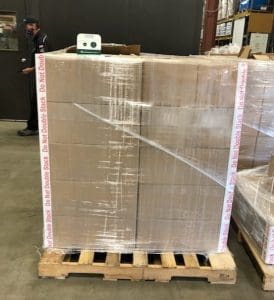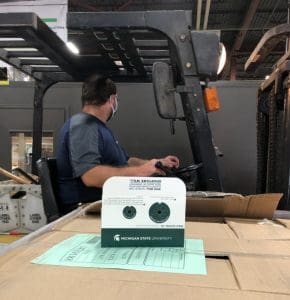Nearly 7,000 MSU students, staff and faculty have registered for the MSU COVID-19 Early Detection Program since its launch in early September to help detect asymptomatic people through saliva testing and mitigate the spread of coronavirus.
Human saliva can hold traces of the virus even before individuals show symptoms. Jack Lipton, chair of the College of Human Medicine’s Department of Translational Neuroscience, said the use of saliva samples — instead of the uncomfortable nasal swab — was an innovation his research team wanted to operationalize to make self-sampling easy, convenient and safe across campus. While Lipton expanded his team with epidemiologists and MSU IT data-gathering specialists, faculty and students from the School of Packaging created an easy-to-produce carton to complete a testing kit for distribution. Led by laboratory manager Aaron Walworth, students assembled more than 15,000 cartons with the school’s plotter table, a system intended for rapid prototyping, not full-on production. Realizing this equipment wouldn’t sustain the increased demand for cartons, external stakeholders stepped in, playing a key role in the program’s success.
Those stakeholders include WestRock, a North Carolina-based packaging company that was tapped to mass produce a newly designed carton. WestRock recently sent 125,000 packages to campus, where they were received with open arms, said Laura Bix, a professor in the School of Packaging.
“When the cartons arrived in East Lansing, it felt like the cavalry was here!” Bix said.
Lipton said the delivery, followed by an even larger shipment expected in December from WestRock, will increase productivity and save packaging students from “burning the midnight oil” trying to keep up with demand. The new carton takes half the time to assemble and load, and with this package, it’s easier to see everything in the kit, reducing packing and user errors. The cost was also reduced by more than 50 percent when sourced from WestRock.
“We can now fit twice as many kits in a distribution box that the drivers deliver around campus, which is a huge space saver both for them in terms of loading boxes, and space needed at pickup locations for holding inventory,” Lipton added.
Collaboration is key
Earlier in her career, Bix worked at Mebane Packaging, a company that has since merged into what is now WestRock. “The designer for this project actually worked closely with me in the old days and we hadn’t seen each other since that time so it was fun to connect,” Bix said.
But WestRock wasn’t the only corporate collaborator to come forward.
“While we were waiting on the WestRock cartons to ship, the School of Packaging ran out of paperboard, and all it took was a single post to LinkedIn and numerous companies from the packaging community and within MSU’s network jumped in to help, sending paperboard that could be used to keep the School of Packaging’s plotter table going,” Bix said. “It’s all about the power of the Spartan network in action.”
That’s a network that involves MSU students, alumni, faculty and industry leaders, Lipton added.
“It’s that bridge back and forth that creates the ability to innovate here on campus and then turn it back out into reality out there,” he said. “It’s taking research and translating it into practice for the greater good.”
Additionally, Bix and Lipton are collaborating with Lowry, an auto-ID solutions provider. The Brighton, Michigan-based company was a key collaborator in ideating how the system would work in ways that didn’t compromise the identities of participants as samples make their way to the lab. Ultimately, they provided 250,000 unique, serialized labels that are key to making the whole system work.
As the scale-up continues, Lowry is now lending their expertise to enhance the efficiencies of the supply chain which delivers the kits. “Better control of the inventory throughout the system will greatly enhance our efficiencies and reduce program costs,” Bix added.
Industry leaders eager to help

Sean Lowry, Lowry’s senior vice president of sales and marketing, said MSU has been a client for many years, and it was a natural fit for his company to connect on the project.
“We were able to share a solution as quick as possible and that’s more important than dollars and cents in corporate profitability,” Lowry said. “During a global pandemic, we were uniquely challenged from a business perspective. Very early we were deemed an essential business, and that has led to opportunities to impact the greater good.”
WestRock also was well-positioned to partner with MSU.
“We’re big Laura Bix fans,” said Elizabeth Whalley Buono, director of WestRock Global Quality, External and Regulatory Affairs. “We were eager to work with MSU and be part of the solution.”
Dave Dwyer, WestRock’s vice president of global marketing, agreed.
“An organization the size of ours, we’re willing and able to jump in a pandemic situation… this just fits into our overall mission,” Dwyer explained. “It’s valuable to cultivate ties. The work being done at MSU and the innovative space there made this a perfect partnership.”
Well received among MSU staff
Rich Chylla, executive director of MSU Technologies, a unit under the MSU Innovation Center, works closely with both Bix and Lipton, and stressed the value of corporate connections.
“Lowry Solutions is a smaller private company that lent their barcode expertise to assist with the development of the anonymous coding and sample tracing on the project. The dedicated healthcare packaging team at WestRock worked closely with MSU to develop a simple yet unique package design,” Chylla said. “These kind of corporate partnerships with MSU is helping solve a problem for the public good.”
Dave Ellis, multimedia producer for ANR Communications in MSU’s College of Agriculture & Natural Resources, said the signup for the COVID-19 Early Detection Program was easy.
“I got the email and text alert on Monday morning at 8 a.m., picked up a kit at 9, and had it returned by 10. It’s an easy-to-follow process once you get the kit,” he said. “The only hard part for me was the 30 minutes before the actual sample collection. You can’t eat, chew gum, or even drink water. But that’s the only real hardship and it really isn’t hard.”
If the program helps keep tabs on the COVID-19 numbers on campus and locally, Ellis said he believes it’s important to provide as much information as possible.
“I think it’s good that MSU came up with a no-cost way (to participants) to both gather information and help those participating to learn more about their own health,” he said. “I would expect nothing less from the university.”
The laboratory capacity will expand to 15,000-20,000 samples per week in January. That’s up from the current 10,000 per week. Learn more here about how to participate in the COVID-19 Early Detection Program.
